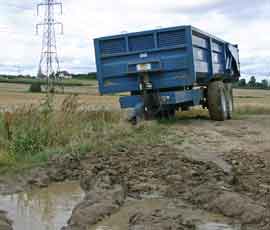Harvest round-up: A wet affair

Heavy showers have brought harvest to a stop across much of the UK today (24 August), with most areas likely to see more rain over the Bank Holiday weekend.
In Northern Ireland, harvest was proving to be a very soggy affair for Graham Furey at Castleview, Killyleagh, County Down.
“It’s been a terrible year here – it almost hasn’t stopped raining since 1 September last year,” he said.
“If I had only grown spring barley and winter wheat I’d be very worried now, as there is just so little cut.”
Even without the showers, Ian Branstone would not have combining today at Bourton Hill Farm, Bourton-on-Water, Gloucestershire, following a combine breakdown.
Instead, he was loading out the first lot of oilseed rape. “We’re cracking on quite well – most of the oilseed rape is drilled, and we’ve only got a little bit of spring barley to cut before getting into the wheat,” he said.
Andrew Jackson was waiting for the weather to improve before getting into wheat at Pink Pig Farm, Holme, Lincolnshire.
“We’ve got all the oilseed rape done, and two thirds of the spring barley, and we’re just poised to do the first of the wheat,” he said.
“I was hoping for a really top yield, but some Fusarium was spotted coming in following a very wet June and July and I am adjusting my yield expectations.”
Yields had been very poor at Conicliffe Grange, Staindrop, Darlington, said Michael Manners.
“We were combining yesterday and the day before, but we’ve just had a heavy shower, and with more forecast, that will probably be it for 10 days now,” he said.
“It wouldn’t be so bad if the yields were worth getting, but this has been the worst harvest since I left college – and that was a long time ago.”
World wheat production was likely to drop to 662m tonnes this year, 34m tonnes below last year’s record, according to the International Grains Council.
Its latest forecast was 3m tonnes lower than last month, due to reduced production in the Black Sea region.
Ending stocks were set to drop by 3m tonnes as well, to 180m tonnes – 17m tonnes lower than last year.

